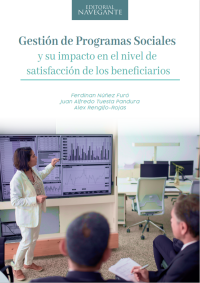Management of social programs and their impact on the level of satisfaction of beneficiaries
Keywords:
social programs, impact, satisfaction, beneficiariesSynopsis
Management is a well-known concept that refers to the process or set of operations to manage any type of resource within a private or state entity, with the aim of achieving goals and benefits. This management can also be understood as an essential procedure to achieve a certain objective such as the solution of a problem (Suárez-Espinar, 2018).
The management process is relevant in several areas of life, since every subject and every organization has goals on different occasions, therefore, management, without a doubt, has a primary role in meeting the objectives of social programs. The management of these programs must be effective and efficient to ensure that the benefits obtain quality goods and services; One form of this management occurs through co-management that requires the full participation of all those involved with the program.
The purpose of social programs is to produce improvements in the living conditions of the population and to reduce the level of poverty. In Peru, there are several programs of this type such as the Qali Warma, Pension 65, Cuna Más and the National Program for Direct Support to the Poorest (National Institute of Statistics and Informatics, INEI, 2020). Therefore, it is understood that social programs facilitate the expansion of an idea of equality throughout the country.
These programs, in any country, are aimed, for the most part, at people who find themselves in an adverse situation that cannot be resolved by themselves, so it is prudent that the management of these programs reflect on the satisfaction they have the beneficiaries about the support received so that the solidarity activities contribute, widely, to the needs of these beneficiaries.
In the field of management, there is the term final beneficiary, who are physical or natural persons who obtain an economic benefit from any legal means such as a business group, a trust, a foundation, a program, among others (The Secretary of the Global Forum on Transparency and Exchange of Information for Tax Purposes, 2019).
This conception is close to that which corresponds to the beneficiaries of social programs, given that they receive contributions from state or private entities in order to satisfy their primary needs. The satisfaction or satisfaction of these needs - in accordance with Monroy and Urcádiz (2018) - is the set of emotions that result from the combination of the expectations and feelings of a person when experiencing the consumption of a good or service. From this, it can be deduced that this satisfaction is one of the topics that are considered within any type of management, therefore, it is pertinent to cover it in the management of social programs.
The management issues of social programs, the social programs themselves, and the beneficiaries and their satisfaction are covered in greater depth throughout this document as they are relevant issues in the social, political and economic sphere of a nation.
Cite (APA)
Núñez, F., Tuesta, J., & Rengifo, A. (2023). Gestión de programas sociales y su impacto en el nivel de satisfacción de los beneficiarios. Editorial Navegante. https://submission.editorialnavegante.com/index.php/SEN/catalog/book/62
Downloads

Downloads
Published
Categories
License

This work is licensed under a Creative Commons Attribution-NonCommercial-NoDerivatives 4.0 International License.






